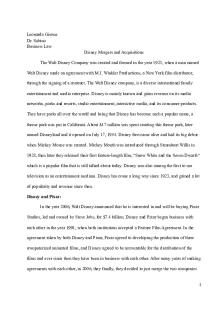Reed\'s Supermarket - Grade: 100 PDF

| Title | Reed\'s Supermarket - Grade: 100 |
|---|---|
| Author | Jordan Pettinger |
| Course | Marketing Management |
| Institution | University of Utah |
| Pages | 2 |
| File Size | 93.2 KB |
| File Type | |
| Total Downloads | 52 |
| Total Views | 124 |
Summary
assignemnt ...
Description
Jordan Pettinger MKTG 4020 January 30th, 2018
Reed Supermarket Case What is Reed’s position in the Columbus market? How does a supermarket make money? In 2011, Reed’s was considered a high-end grocery store, and in terms of quality and customer service, was a definite market leader carrying a variety of products with a balance of conventional, gourmet, and organic items. The company was however, viewed as having high prices, yet Reed’s carried a mix of high-end items and private label products in order to maintain margins, using weekly promotional sales in order to drive more traffic to the store. Reeds at the time was the lead food retailer with 14% market share, and absolutely no plans to open new stores in the following year. Due to low margins, supermarkets tend to rely on high sales volume and operating efficiency in order to maintain overall profitability. Should Collins continue the dollar special campaign? What is the financial impact of this decision? The dollar special campaign should be discontinued. The campaign does not improve the high-quality perception of Reed’s supermarket for consumers, and can negatively impact the company’s current reputation of being a high-end retail food store. Though the promotion drives sales volume up, in the long-run, are not profitable. With the current dollar special promotion, items are discounted weekly around 44%. With an original price of $2.70, and a gross margin of 22.7%, costs of goods sold would be $2.08. If the company continues to sell these items at $1.50 during these specials, Reed’s is looking at a $0.59 loss on each unit sold, and a margin of -39.3%. Net profit for discounted products would be -$1.15 with a profit margin of -76.7%, assuming the total expense is $0.56. This shows that the dollar special promotion is not driving the sales of higher margin items to compensate for what it is actually doing, which is losing Reed’s money instead of bringing profits in. What should Collins action plan for Reed be for 2011? Collin’s should first and foremost discontinue the dollar specials program due to the fact it is not increasing overall market share, nor is it aiding with Reed’s current high-image brand perception. She should utilize other resources such as advertising, and promote the value that Reed’s offers its customer in terms of service and quality of the items being sold. Reed’s should offer more private label brands, which carry larger margins, and are growing in market share, in order to compete with Aldi, which is opening three new stores. Reed’s should continue to position themselves amongst its current target segment, and continue to market towards older, more affluent (with a smaller household size) consumers, than those who would be found shopping at dollar stores.
Additional notes -Overall supermarket sales $4.7 billion -Reed market share-14% -Sales $660 million 2010 -5% decrease from 2005-2010 -Gross Margin 22.7%, Net 2.1% -Dollar Store Margin 8.5%, Aldis -1.5% -Average revenues 1-2% increase/year
$2.07 * (1-.227)= COGS $2.08...
Similar Free PDFs

Reed\'s Supermarket - Grade: 100
- 2 Pages

Editorial - Grade: 100
- 3 Pages

Measuring Behavior - Grade: 100
- 6 Pages

A1Essay-Eng122 - Grade: 100
- 4 Pages

Mate Selection - Grade: 100
- 5 Pages

Critical review - Grade: 100
- 3 Pages

Indi pop - Grade: 100
- 5 Pages

I Must - Grade: 100
- 2 Pages

Concert review - Grade: 100
- 2 Pages

GRW 4 - Grade: 100
- 3 Pages

Assignment 2 - Grade: 100
- 3 Pages

Supermarket Assignment
- 2 Pages

Natureview Farm - Grade: 100
- 2 Pages

Miranda - Grade: 100
- 5 Pages

Disney Merger - Grade: 100
- 13 Pages
Popular Institutions
- Tinajero National High School - Annex
- Politeknik Caltex Riau
- Yokohama City University
- SGT University
- University of Al-Qadisiyah
- Divine Word College of Vigan
- Techniek College Rotterdam
- Universidade de Santiago
- Universiti Teknologi MARA Cawangan Johor Kampus Pasir Gudang
- Poltekkes Kemenkes Yogyakarta
- Baguio City National High School
- Colegio san marcos
- preparatoria uno
- Centro de Bachillerato Tecnológico Industrial y de Servicios No. 107
- Dalian Maritime University
- Quang Trung Secondary School
- Colegio Tecnológico en Informática
- Corporación Regional de Educación Superior
- Grupo CEDVA
- Dar Al Uloom University
- Centro de Estudios Preuniversitarios de la Universidad Nacional de Ingeniería
- 上智大学
- Aakash International School, Nuna Majara
- San Felipe Neri Catholic School
- Kang Chiao International School - New Taipei City
- Misamis Occidental National High School
- Institución Educativa Escuela Normal Juan Ladrilleros
- Kolehiyo ng Pantukan
- Batanes State College
- Instituto Continental
- Sekolah Menengah Kejuruan Kesehatan Kaltara (Tarakan)
- Colegio de La Inmaculada Concepcion - Cebu
